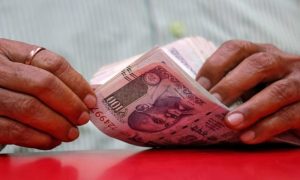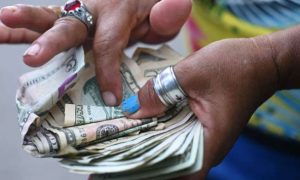Gamblers who play slot machines may soon be able to win more money before the Internal Revenue Service takes notice — and it could be the recent stretch of hot inflation that melts away some longstanding rules around gambling and taxes.
When Americans gamble, the house always wins. But so does the taxman. Gambling winnings are fully taxable, according to the IRS. After a big day at the casino, the horse track or the bingo hall, winners need to report their jackpots on their income taxes.
When it comes to slot machines, winning an amount over $1,200 will trigger a tax form. The payer, such as a casino, has to furnish the winner and the IRS with a Form W-2G, which the winner submits with their personal income-tax return.
The threshold triggering tax reporting on slot-machine winnings has stayed the same since 1977. But an old-fashioned flood-of-coins jackpot doesn’t go as far as it used to.
On Tuesday, IRS Commissioner Danny Werfel told lawmakers that some “serious” thought is being given to increasing the threshold.
“I know that this particular recommendation is under serious consideration,” Werfel said at a House Appropriations subcommittee hearing on the proposed IRS budget, adding that it’s ultimately the Treasury Department’s decision.
The Treasury Department did not immediately respond to a request for comment.
When it comes to purchasing power, a $1,200 payout in March 1977 would equal nearly $6,300 in March 2024, according to a Bureau of Labor Statistics inflation calculator.
That’s why the threshold needs an update, some lawmakers say. As the size of payouts has gone up over time, those payouts have produced more tax forms — and potentially more confusion for taxpayers and more bureaucracy for casinos.
Read More : I’m a Bank Teller: 3 Times You Should Never Ask For $100 Bills at the Bank
Werfel’s update came after a question from Rep. David Joyce, a Republican from Ohio who is a member of the Congressional Gaming Caucus. Joyce also chairs the House Appropriations Committee’s subcommittee on financial services and general government, which held Tuesday’s hearing.
Last May, members of the Congressional Gaming Caucus reintroduced a bill that would increase the tax-reporting threshold to $5,000 and, going forward, index the threshold to inflation. They had first introduced the bill in March 2022, calling it the Shifting Limits on Thresholds, or SLOT, Act. The bill hasn’t gone far since then, not getting past referral to the Ways and Means Committee each year.
In the February letter, the lawmakers pointed to a recommendation that the tax threshold rise to $5,000 that came from an IRS advisory council, an entity made up of tax professionals, consumer advocates and others.
Read More : I’m a Bank Teller: 3 Times You Should Never Ask For $100 Bills at the Bank
The higher threshold on slot-machine winnings could help ease a flood of tax forms, the IRS advisory council said in a November report.
Even in 2020, when casinos closed and then only partially reopened, the IRS still processed nearly 16 million W-2G forms, the advisory report said. The IRS expects to process more than 18 million of these forms by the end of 2024, the report said.
Even as casinos are churning out more tax forms, the report said, those forms aren’t necessarily giving the IRS a full view of gamblers’ taxable income.
While the form captures a moment in time when someone won, it doesn’t capture all the money that person lost on slots, the report said.
“Most slot-machine customers are in a net loss position at the end of the year,” the report said. An higher threshold would let the IRS focus on taxpayers who actually come out ahead in net gambling income, the report noted.
“From a technical standpoint, nothing changes” if the threshold increases, said Russell Fox, managing member of Las Vegas-based Clayton Financial and Tax, which has a specialty in taxes for amateur and professional gamblers. But “from a practical standpoint, a ton changes,” he said. “I’m not naive. … This will decrease the amount of reporting that has to be done on gambling.”
“I appreciate Commissioner Werfel coming before the Committee,” Joyce said in a statement. “He seemed receptive and committed to working within the IRS and the Treasury to increase the outdated W-2G threshold.”
Read More : Donald Trump’s Law Firm Doesn’t Want to Represent Him Anymore
Joyce and more than 20 other Republican and Democratic lawmakers asked Werfel to raise the tax-reporting threshold for slot-machine winnings in a February letter.
No matter the threshold for the W-2G, the IRS will still expect the recipient to report their winnings on their taxes, he noted. If the sum isn’t reported, the winner should expect an underreporting notice from the tax agency.
Gamblers need to report all their profits and losses using the “session method,” by which people keep track of their net profits or losses during each gambling session, Fox said.
The IRS lets people deduct their gambling losses. But any deduction is capped at the amount of their gambling winnings that year. And to take the write-off, taxpayers need to itemize their deductions. Most taxpayers opt to take the standard deduction instead.
Significant, unnecessary burdens for consumers, casino operators and the IRS’
Most gamblers tend to get wrapped up in the gambling, not the recordkeeping for tax purposes, Fox said.
There’s a gas station near Fox that advertises $1,199 payouts on its games, he noted, adding that he hasn’t been inside.
It’s a sly nod to reality, he said. “Very few individuals report gambling winnings unless they have tax paperwork, because they are thinking, ‘I lost for the year.’ Which is the case for almost everyone,” he said.
Fox hopes the Treasury Department raises the threshold, because it would make his life easier. His clients report their net winnings and losses each session, but that doesn’t always align with the numbers on W-2Gs. Fewer tax forms kicking in at higher payouts would mean fewer complicated back-and-forths with the IRS.
Read More : Donald Trump’s Law Firm Doesn’t Want to Represent Him Anymore
But he’s not expecting a change. “We’re in a time period of huge deficits. Anything lowering the amount of taxes collected, I don’t see in the cards,” he said.
Casinos would also benefit from higher thresholds, Fox said. Generally, after a slot-machine win above $1,200, the player has to see a casino worker, who fills out the tax paperwork on the spot, he said.
“Updating the antiquated slot-tax threshold would relieve significant, unnecessary burdens for consumers, casino operators and the IRS,” said Chris Cylke, senior vice president for government relations with the American Gaming Association, a U.S. casino-industry trade group.
Slot machines represent big money for casinos, pulling in $35.5 billion last year, according to the group’s revenue tracker.
“The AGA is grateful to see building momentum around modernizing this long-outdated policy and joins congressional leaders in urging Commissioner Werfel to follow [the IRS Advisory Council’s] guidance to raise the threshold,” he said.
How inflation affects tax rules
Whatever happens with the regulations surrounding slot-machine winnings, it’s another example of the ways inflation interacts with taxes.
The standard deduction and tax brackets are indexed to rise each year with the cost of living, but other parts of the tax code have no built-in inflation adjustments.
For example, capital-gains taxes kick in on profits beyond $250,000 when a person sells their home, or $500,000 for a married couple. The threshold has been at this level since 1997.
It’s been even longer since investors with hard luck got an inflation adjustment for their taxes. The deduction on capital losses has been stuck at $3,000 since 1978.









































